Nietzsche: The Intellectual Pursuit of Philosophy and Cultural Revolution – Tracing His Life’s Path and Legacy
イントロダクション
ニーチェとは、19世紀のドイツの思想家であり古典文献学者です。
実存主義の代表的な哲学者の一人として知られています。
彼の思想は、「私たちはどのように生きるべきか」という問いに対して、既存の価値を破壊し、新たな価値を創造する「超人」となるべきだという主張です。
また、「道徳」や「真理」などの概念の起源を批判的に分析し、それらが人間の弱さや欺瞞に基づくものであると主張しています。
ニーチェは、「神は死んだ」と宣言し、キリスト教やプラトン主義などの伝統的な価値観を否定しました。
また、「永劫回帰」という概念を用いて、人間が自分の人生を全面的に肯定することの重要性を説きました。
彼には多くの有名な著書があり、『悲劇の誕生』、『反時代的考察』、『人間的な、あまりにも人間的な』、『悦ばしき知識』、『ツァラトゥストラはかく語りき』などは彼の思想を大きく反映しています。
ニーチェの思想は、多くの分野に影響を与えています。文学、芸術、心理学、政治、宗教などにおいて、ニーチェのアイデアは受容されたり批判されたりしています。
Introduction
Friedrich Nietzsche was a 19th-century German philosopher and classical philologist.
He is known as one of the prominent existentialist philosophers.
His philosophy asserts that in answering the question “how should we live,” one should destroy existing values and create new ones, striving to become the “Übermensch” or “overman.”
Nietzsche critically analyzed the origins of concepts like “morality” and “truth,” arguing they are rooted in human weakness and deception.
He famously declared “God is dead,” rejecting traditional values such as Christianity and Platonism.
Using the concept of “eternal recurrence,” he emphasized the importance of fully affirming one’s life.
Nietzsche authored many famous works including “The Birth of Tragedy,” “Untimely Meditations,” “Human, All Too Human,” “The Gay Science,” and “Thus Spoke Zarathustra,” each reflecting his profound philosophical ideas.
Nietzsche’s thought has had a significant impact across various fields—literature, art, psychology, politics, and religion—where his ideas have been both embraced and contested.
ニーチェの生涯
ニーチェはプロイセン王国(現在のドイツ)のロックム出身で、厳格なプロテスタントの家庭に生まれました。
若いころから優れた学生で、哲学や古典学を学びました。
彼は歴史的な哲学的・文学的伝統に挑戦し、その後自身の独自の哲学的視点を発展させていくことになります。
しかし、ニーチェの哲学は当初はあまり理解されず、晩年には精神的な問題に悩まされるようになりました。
そして1889年に精神的な崩壊を経験し、以降は療養のために療養所に入ることが多くなりました。
彼はその後も生涯を終えるまで哲学的な執筆を続けましたが、その晩年は静かな隠遁生活を送りました。
ニーチェは、死後にその哲学が広く認識され、20世紀の哲学と文化に大きな影響を与えることとなりました。
少年時代
ニーチェの家庭は厳格なプロテスタントの宗教的な環境でした。
父親は牧師であり、信仰心が家庭に強く影響を及ぼしていましたが、ニーチェが5歳のときに亡くなりました。
ニーチェは幼少期から健康上の問題に悩まされており、若いころから慢性的な頭痛や目の問題を抱え、これらの問題が後に彼の人生と哲学的な思考に影響を与えることになりました。
ニーチェは学業において非常に優れた生徒で、クラシックな教育を受け、古典学や文学に興味を持ちました。
彼の学業成績の優秀さが彼の知識欲と批判的な思考を形成する上で重要な役割を果たしました。
青年時代
ニーチェは幼少期から音楽と言語に興味を示し、優秀な成績を収めました。
1858年にはシュルピナー・シューレという名門校に入学し、古典文学や哲学を学びました。
Nietzsche’s Life
Friedrich Nietzsche was born in Röcken, Prussia (present-day Germany), into a strict Protestant family.
From a young age, he excelled academically, studying philosophy and classical literature.
He challenged the historical philosophical and literary traditions, developing his own unique philosophical perspectives.
Initially, Nietzsche’s philosophy was not widely understood, and in his later years, he struggled with mental health issues.
In 1889, he experienced a mental breakdown and spent much of his time thereafter in sanatoriums for recuperation.
Despite this, he continued to write philosophically until the end of his life, living quietly in seclusion during his later years.
Nietzsche’s philosophy gained significant recognition posthumously, profoundly influencing 20th-century philosophy and culture.
Childhood
Nietzsche grew up in a strict Protestant household where his father, a pastor, deeply influenced the family’s religious devotion. His father passed away when Nietzsche was just five years old.
He suffered from health issues from a young age, including chronic headaches and eye problems, which later influenced his life and philosophical thinking.
Nietzsche excelled academically, receiving a classical education and developing an interest in classical studies and literature.
His outstanding academic performance played a crucial role in shaping his intellectual curiosity and critical thinking.
Youth
From early childhood, Nietzsche showed an interest in music and languages, achieving high academic success.
In 1858, he enrolled at the prestigious Schulpforta school, where he studied classical literature and philosophy.
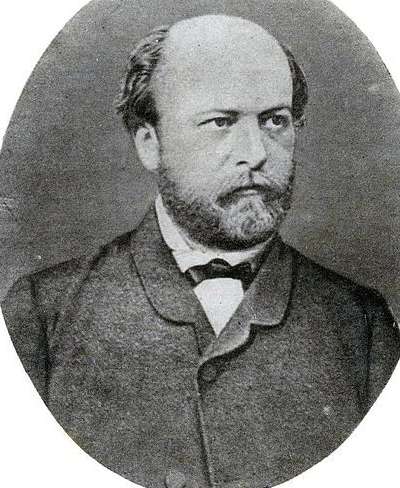
Friedrich Albert Lange: German Philosopher and Historian of Thought
1864年にはボン大学に進学し、フィリップ・ライヒリンやフリードリヒ・アルベルト・ランゲといった著名な哲学者に師事しました。
In 1864, he enrolled at the University of Bonn, studying under prominent philosophers such as Philipp Mainländer and Friedrich Albert Lange.
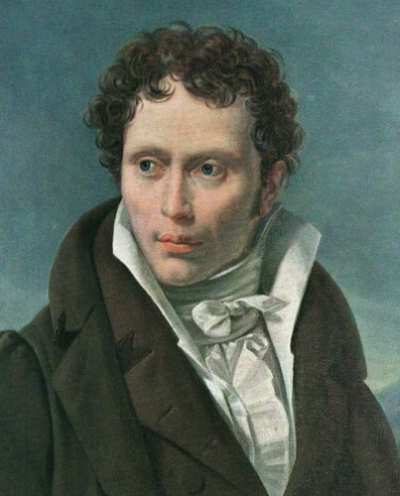
Arthur Schopenhauer (February 22, 1788 – September 21, 1860): German philosopher known for “The World as Will and Representation” (1819).
1865年にはライプツィヒ大学に移り、そこでアルトゥル・ショーペンハウアーの著作に出会い、深い感銘を受けました。
1869年にはバーゼル大学の古典文献学の教授に就任し、若くして名声を得ました。
In 1865, he moved to Leipzig University where he encountered Arthur Schopenhauer’s writings and was deeply impressed.
In 1869, he assumed the position of professor of classical philology at the University of Basel, achieving fame at a young age.
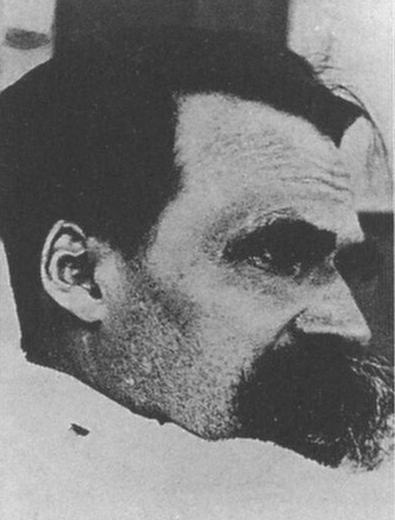
Nietzsche in His Later Years, 1899
狂気と死
ニーチェは40歳を過ぎるころから精神を病み、その後の人生を狂気の中で過ごしました。
狂気の原因は、今でも議論が分かれていますが、哲学的な思想、梅毒や脳腫瘍、遺伝的な精神病などが考えられています。
彼の狂気時代には、自分をキリストやディオニュソスと同一視したり、友人や敵に奇妙な手紙を送ったりしました。
自分の思想が理解されず、孤独と苦悩に満ちた人生を送っていたことが伺えます。
彼は1900年に肺炎で亡くなりましたが、その死にも不幸な事情がありました。
Madness and Death
After turning 40, Nietzsche suffered from mental illness and spent the remainder of his life in a state of madness.
The causes of his madness remain debated, with possible factors including his philosophical ideas, syphilis, brain tumors, and genetic mental illness.
During his period of insanity, Nietzsche identified himself with figures like Christ and Dionysus, and sent bizarre letters to friends and foes alike.
It is evident that he lived a life filled with loneliness and torment, feeling misunderstood in his philosophical ideas.
Nietzsche died of pneumonia in 1900, but his death was also marked by unfortunate circumstances.
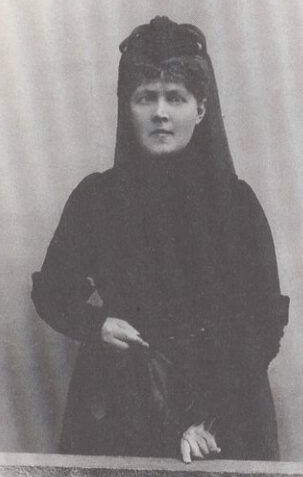
Elisabeth Förster-Nietzsche, circa 1894
彼の姉妹であるエリザベートは、彼の遺稿を改竄してナチスの思想に利用しようとしました。
彼の墓には「神は死んだ」という言葉が刻まれていますが、それは彼の本意ではなかったかもしれません。
His sister, Elisabeth, altered his manuscripts to align them with Nazi ideology.
His tombstone bears the words “God is dead,” though this might not have been his true intention.
ニーチェの思想
ニーチェの思想の主なテーマの一つは「超人」という概念です。
超人とは、自分自身を超越し、自分の価値観を創造する人間のことです。
ニーチェは、キリスト教や道徳などの伝統的な価値観は、人間の力や創造性を抑圧するものだと考えました。
彼は、人間は自分の意志や情熱に従って生きるべきだと主張しました。
「超人」も含めて彼の思想の概念を詳しく解説していきます。
解釈の多様性
ニーチェは、解釈の多様性について、人間の認識や価値観は主観的で相対的であるという考え方を展開しました。
ニーチェによれば、真理や客観性というものは存在せず、人間は自分の視点や利益に基づいて世界を解釈するにすぎません。
したがって、同じ事象に対しても、異なる人間や文化や時代によって、様々な解釈が可能であり、それらはどれも正しいとも間違っているとも言えないのです。
ニーチェは、このような解釈の多様性を肯定的に捉えることで、人間の自由や創造性を高めることができると主張しました。
永劫回帰
ニーチェの永劫回帰とは、宇宙の状態が有限であるのに対して、時間は無限であるという仮定のもとで、すべての出来事は無限に繰り返されるという思想です。
ニーチェは、永劫回帰を「あらゆる出来事が同じ順番で、永遠にくり返されるとする考え方」と定義しています。
また、永劫回帰は、過去と未来がすべて繰り返されるという考え方ではなく、超人的な意思によってある瞬間とまったく同じ瞬間を次々に、永劫的に繰り返すことを確立するという思想であるとも述べています。
ニーチェは、永劫回帰を受け入れることで、人間は生きる喜びを再発見できると考えました。
なぜなら、永劫回帰を受け入れることで、人間は自分の人生を無駄に過ごすことを恐れなくなるからです。
人間は、自分の人生が永遠に繰り返されると考えれば、今この瞬間を大切に生きようとします。
永劫回帰は、非常に難解な概念ですが、ニーチェの哲学の中で最も重要な概念の一つです。
永劫回帰を理解することは、ニーチェの哲学を理解する上で不可欠です。
超人
ニーチェの超人とは、ニーチェが提唱した哲学的な概念です。
超人とは、現代の道徳や価値観にとらわれず、自らの意志と創造力によって新しい価値を生み出す人間のことです。
ニーチェは、現代の人間は「最後の人間」と呼ばれる退屈で無気力な存在であり、神や理性に頼ることで自分の責任を回避していると批判しました。
ニーチェにとって、超人は「最後の人間」を超えるための理想であり、人間の可能性を最大限に発揮する存在であり、ニーチェは、超人を目指すことで、人間は自己実現と自己超克を達成し、生の意味を見出すことができると主張しました。
古代インド思想
ニーチェは、古代インド思想に深い関心を持っていました。
彼は、ヴェーダ、ウパニシャッド、マハーバーラタ、ラーマーヤナなどのテキストを研究し、その思想に大きな影響を受けました。
ニーチェは、古代インド思想の特徴である「無我」「輪廻」「解脱」に共感しました。
彼は、無我とは、個人の自我は幻想であり、真の自我は宇宙と同一であるという考え方であると解釈しました。
輪廻とは、人間の魂は死後、別の存在に生まれ変わるということを意味します。
解脱とは、輪廻から解放されることであり、真の幸福に至ることです。
ニーチェは、古代インド思想の思想を、自分の哲学に取り入れました。
彼は、無我の思想を、人間の自由を獲得するために重要であると主張しました。
また、輪廻の思想を、人間の人生を肯定するために重要であると主張しました。
さらに、解脱の思想を、人間の生きる目的を明らかにするために重要であると主張しました。
Nietzsche’s Philosophy
One of the main themes in Nietzsche’s philosophy is the concept of the “Übermensch” or “Superman.”
The Übermensch is an individual who transcends their own limitations and creates their own values.
Nietzsche believed that traditional values, such as those of Christianity and morality, suppressed human strength and creativity.
He argued that people should live according to their own will and passions.
This overview will delve into the concept of the Übermensch and other key ideas in Nietzsche’s thought.
Diversity of Interpretation
Nietzsche proposed that human perceptions and values are subjective and relative.
According to him, there is no absolute truth or objectivity; people interpret the world based on their own perspectives and interests.
Thus, different individuals, cultures, and eras can have various interpretations of the same events, none of which can be definitively labeled as right or wrong.
Nietzsche viewed this diversity of interpretation positively, asserting that it enhances human freedom and creativity.
Eternal Recurrence
Nietzsche’s concept of eternal recurrence posits that all events in the universe repeat infinitely because while the state of the universe is finite, time is infinite.
He defined eternal recurrence as the idea that every event will recur in the same sequence forever.
This notion is not about the cyclical repetition of past and future events, but about the idea that, through a superhuman will, the exact same moments are continuously and eternally repeated.
Nietzsche believed that accepting eternal recurrence would help individuals rediscover the joy of living because they would no longer fear wasting their lives.
By embracing eternal recurrence, people would strive to live each moment to its fullest.
Understanding eternal recurrence is crucial to comprehending Nietzsche’s philosophy, as it is one of his most significant concepts.
The Übermensch
The Übermensch is a philosophical concept introduced by Nietzsche.
This ideal human transcends contemporary morals and values, creating new ones through their own will and creativity.
Nietzsche criticized modern humans, whom he called the “last men,” as being dull and apathetic, avoiding responsibility by relying on God and reason.
For Nietzsche, the Übermensch represents the ideal that transcends the “last men,” fully realizing human potential.
He argued that striving to become an Übermensch would enable individuals to achieve self-realization, self-overcoming, and find meaning in life.
Ancient Indian Thought
Nietzsche had a profound interest in ancient Indian thought.
He studied texts such as the Vedas, Upanishads, Mahabharata, and Ramayana, which significantly influenced his ideas.
Nietzsche resonated with concepts like “anatta” (non-self), “samsara” (reincarnation), and “moksha” (liberation).
He interpreted anatta as the belief that the individual self is an illusion and that the true self is identical with the universe.
Samsara refers to the cycle of death and rebirth, while moksha is liberation from this cycle and the attainment of true happiness.
Nietzsche incorporated these ideas into his philosophy, advocating that the notion of anatta was crucial for achieving human freedom.
He saw samsara as essential for affirming life and moksha as important for clarifying the purpose of human existence.
ナチズムへの利用
ニーチェのナチズムへの利用について、多くの議論があります。
ニーチェ自身はナチズムとは無縁であり、その思想はナチスによって歪められたという見方が一般的です。
しかし、ニーチェの思想にはナチズムとの共通点も見られます。
例えば、ニーチェは「超人」という概念を提唱しましたが、これはナチスの「アーリア人」という理念に近いものです。
また、ニーチェはキリスト教や民主主義などの普遍的な価値観を否定し、個人の力や意志を重視しましたが、これもナチスの全体主義や指導者原理と一致する部分があります。
さらに、ニーチェは歴史や文化を「強者」と「弱者」の闘争と捉え、強者が弱者を支配することを肯定しましたが、これはナチスの「生存競争」という思想に通じるものです。
以上のように、ニーチェの思想はナチズムへの利用に適した要素を含んでいました。
しかし、それだけではなく、ニーチェの思想はナチズムと対立する側面も持っていました。
例えば、ニーチェは反ユダヤ主義ではなく、ユダヤ人を高く評価していました。
また、ニーチェはドイツ民族主義にも批判的であり、ドイツ人を「音楽以外では何もできない」と皮肉っていました。
さらに、ニーチェは自由な精神や創造性を尊重し、一枚岩の集団や独裁者に従うことを嫌っていました。
以上のように、ニーチェの思想はナチズムと相容れない部分も多くありました。
結論として、ニーチェのナチズムへの利用は不当であり、その思想はナチズムと一致しないことが分かります。
The Appropriation of Nietzsche by Nazism
There is much debate about the appropriation of Nietzsche’s ideas by Nazism.
It is generally believed that Nietzsche himself was not connected to Nazism, and that his ideas were distorted by the Nazis.
However, some aspects of Nietzsche’s philosophy do share similarities with Nazi ideology.
For example, Nietzsche’s concept of the “Übermensch” can be likened to the Nazi ideal of the “Aryan race.”
Nietzsche’s rejection of universal values like Christianity and democracy, in favor of individual power and will, also aligns with the Nazi principles of totalitarianism and Führerprinzip (leadership principle).
Moreover, Nietzsche viewed history and culture as a struggle between the “strong” and the “weak,” endorsing the dominance of the strong, which resonates with the Nazi idea of “survival of the fittest.”
Despite these similarities, Nietzsche’s philosophy also contains elements that oppose Nazism.
For instance, Nietzsche was not anti-Semitic and held Jews in high regard.
He was critical of German nationalism and even mocked Germans, saying they were “good for nothing except for music.”
Nietzsche valued free spirit and creativity, and he despised the idea of following a monolithic group or a dictator.
In conclusion, while Nietzsche’s philosophy had elements that could be misappropriated by the Nazis, it also contained many aspects that were fundamentally opposed to Nazi ideology. Thus, the Nazi use of Nietzsche’s ideas was unjust and misaligned with his true philosophical beliefs.
それ以後の哲学思想への影響
ニーチェのそれ以降の哲学への影響は、非常に大きくて多岐にわたっています。
ニーチェは、西洋の伝統的な倫理や宗教を批判し、人間の存在や価値について新しい視点を提供しました。
ニーチェの思想は、20世紀のさまざまな哲学者や思想家に影響を与えました。
例えば、存在主義者は、ニーチェの「神は死んだ」という言葉や、人間の自由や責任についての考え方を引用しました。
また、ポストモダニズムの哲学者は、ニーチェの真理や言語に対する相対主義的な態度や、権力や支配に関する分析を参考にしました。
さらに、フェミニストやポストコロニアリストなどの批判的な理論家も、ニーチェの強者と弱者の関係や、奴隷道徳と主人道徳の区別などを用いて、社会や文化における不平等や抑圧を批判しました。
ニーチェの哲学は、現代社会においても有意義で刺激的な問題提起を行っています。
Influence on Subsequent Philosophical Thought
Nietzsche’s influence on later philosophy is extensive and profound.
He critiqued traditional Western ethics and religion, offering new perspectives on human existence and values.
Nietzsche’s ideas impacted various 20th-century philosophers and thinkers.
For instance, existentialists drew on Nietzsche’s declaration that “God is dead” and his views on human freedom and responsibility.
Postmodern philosophers referenced Nietzsche’s relativistic attitudes towards truth and language, as well as his analyses of power and domination.
Additionally, critical theorists, including feminists and postcolonialists, utilized Nietzsche’s concepts of the relationship between the strong and the weak, and the distinction between slave morality and master morality, to critique social and cultural inequalities and oppression.
Nietzsche’s philosophy continues to pose meaningful and provocative questions in contemporary society.
ニーチェの著作の概要
ニーチェの著作は多岐にわたり、様々なテーマやスタイルを取り入れていますが、一般的には存在論、価値論、歴史哲学、文化批評などに分類されます。とくに有名な著書を詳しく解説していきます。
Overview of Nietzsche’s Works
Nietzsche’s writings cover a wide range of themes and styles, generally categorized into ontology, axiology, philosophy of history, and cultural criticism. Here, we will delve into some of his most renowned works in detail.
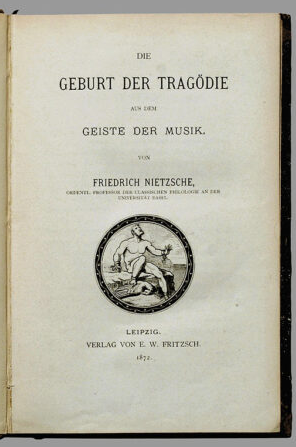
Title Page of the First Edition of “The Birth of Tragedy” (1872)
『悲劇の誕生』
『悲劇の誕生』は、1872年に発表された、フリードリヒ・ニーチェの初期の著作です。
この書でニーチェは、ギリシア悲劇の起源を探り、その本質を分析しました。
The Birth of Tragedy
“The Birth of Tragedy,” published in 1872, is one of Friedrich Nietzsche’s early works.
In this book, Nietzsche explores the origins of Greek tragedy and analyzes its essence.
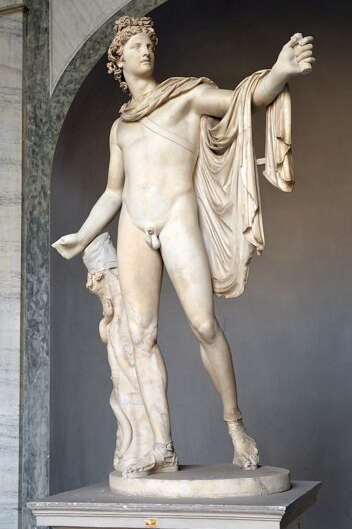
Apollo: God of Light, Art, and Prophecy
Apollo, the god of light, art, and prophecy, depicted in the Belvedere Apollo, dating from around 120 to 140 AD, housed in the Vatican Museums.
ニーチェは、ギリシア悲劇は、アポロン的な精神とディオニュソス的な精神の融合によって生まれた芸術であると主張しました。
アポロン的な精神は、理性、秩序、調和を象徴するものであり、ディオニュソス的な精神は、情熱、混沌、陶酔を象徴するものです。
Nietzsche argued that Greek tragedy emerged as an art form through the fusion of the Apollonian spirit and the Dionysian spirit.
The Apollonian spirit symbolizes reason, order, and harmony, while the Dionysian spirit embodies passion, chaos, and ecstasy.
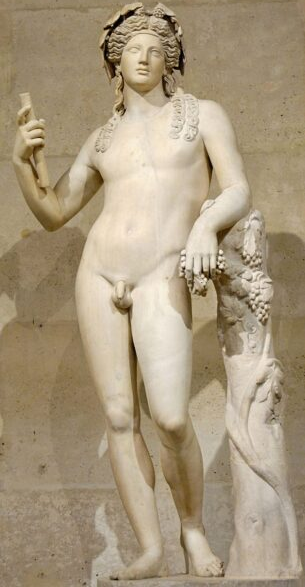
Dionysus, the god of wine, intoxication, and fertility, depicted in a 2nd-century Roman statue modeled after an original from the Hellenistic period. Currently housed in the Louvre Museum.
ニーチェは、これらの二つの精神が対立しながらも調和し、ギリシア悲劇の独特な美しさを生み出したと主張しました。
『悲劇の誕生』は、ニーチェの哲学思想の原型となる書です。
この書でニーチェは、伝統的な哲学を批判し、新しい価値観を創造しようとしました。
また、この書でニーチェは、芸術と哲学を密接に結びつけました。
『悲劇の誕生』は、ニーチェの哲学思想の理解に欠かせない書です。
『反時代的考察』
ニーチェの著作『反時代的考察』は、彼の初期の著作の一部であり、4つのエッセイからなるシリーズです。
このシリーズでは、ニーチェは19世紀の文化や知識人の傾向に対する批判を通じて、個人の精神的な自由と独自性の重要性を強調しています。
以下に、各エッセイの要点を簡単に説明します。
・「デヴィッド・ストラウス、告白者と著述家」:このエッセイでは、ニーチェは当時の著名な神学者であるデヴィッド・ストラウスの著作を取り上げて批判しています。
彼は、ストラウスの批判的な宗教著作が単なる著作家としての意図であると考え、その哲学的な意義を問い直しました。
同時に、個人の信念や独自の思考が大切であると主張しています。
The Birth of Tragedy
Nietzsche argued that despite their opposition, the harmonious fusion of these two spirits created the unique beauty of Greek tragedy.
The Birth of Tragedy serves as a prototype of Nietzsche’s philosophical thought. In this work, he critiques traditional philosophy and seeks to create new values.
Moreover, Nietzsche closely intertwines art and philosophy in this book, making it indispensable for understanding his philosophical ideas.
Untimely Meditations
Nietzsche’s Untimely Meditations is part of his early works, comprising a series of four essays.
In this series, Nietzsche emphasizes the importance of personal spiritual freedom and individuality through critiques of 19th-century culture and intellectual trends.
Here’s a brief overview of each essay:
- David Strauss: the Confessor and the Writer: Nietzsche critiques the works of the prominent theologian David Strauss, suggesting that Strauss’s critical religious writings are driven more by his role as a writer than by philosophical intent. Nietzsche challenges the philosophical significance of Strauss’s works while asserting the importance of individual beliefs and independent thinking.
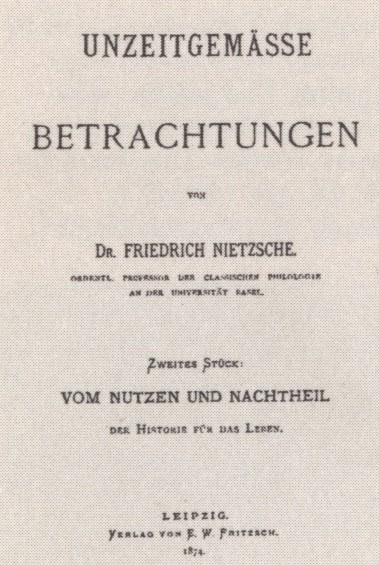
“Unfashionable Observations” Chapter 2: “The Advantages and Disadvantages of History for Life” (Title Page of the First Edition, 1874)
・「生に対する歴史の利害」:このエッセイでは、ニーチェは歴史的教育の役割について議論しています。
彼は、歴史に囚われることなく、現在の生活を豊かにするために歴史を利用すべきだと述べました。
過去の出来事を研究することで、個人や社会が成長し、進化するためのヒントを得ることができると説いています。
・「教育者としてのショーペンハウアー」:このエッセイでは、哲学者アーサー・ショーペンハウアーの思想とその影響に焦点を当てています。
ニーチェは、ショーペンハウアーの悲観主義的な世界観を肯定しつつも、その世界観が人々に現実から逃げることを促す可能性があると警告しています。
・「バイロイトにおけるリヒャルト・ワーグナー」:このエッセイでは、リチャード・ワーグナーの楽劇に対する評価が、芸術の理解と個人の経験にどのような影響を与えるかを検討しています。
ニーチェはワーグナーの楽劇が単なる感情的な楽しみを提供するだけでなく、深い精神的な成長の機会を提供すると主張しました。
『人間的な、 あまりにも人間的な』
ニーチェの『人間的な、あまりにも人間的な』は、彼の初期の著作の一つであり、1878年に出版されました。
この本は、ニーチェが哲学者としての独自のスタイルと思想を確立し始めた時期に書かれたものでもあります。
ニーチェは、この本で、従来の道徳や宗教、芸術、文化などに対する批判的な見方を展開し、人間の本性や価値観に関する新しい洞察を提供しています。
ニーチェは、人間が自分自身や世界について持っている信念や感情は、しばしば偏見や錯覚に基づいており、それらを超えて真実に迫ることが必要だと主張しました。
ニーチェは、自由な精神としての哲学者の役割は、人間的なものをあまりにも人間的に見ることではなく、人間的なものを超えることだと述べています。
『悦ばしき知識』
ニーチェの著作『悦ばしき知識』は、彼の哲学的著作の一つであり、1882年に発表されました。
この著作は、ニーチェの中期の時期に書かれたもので、彼の思想が成熟し、さらに深化した時期の著作です。
また、ニーチェの有名な概念である「永劫回帰」を初めて提唱した著作でもあります。
他にもニーチェはこの著作で「アモール・ファティ」(運命への愛)という概念を探求しています。
彼は運命に抗うのではなく、運命を肯定的に受け入れることで人生を充実させるべきだと説きました。
永劫回帰のアイデアも、アモール・ファティの一部として捉えられることがあります。
さらに、ニーチェはニヒリズム(虚無主義)についての懸念を表明しています。
彼は、価値の崩壊や目的の欠如が社会的な問題を引き起こす可能性を指摘しました。
永劫回帰やアモール・ファティの概念は、こうしたニヒリズムからの脱却を試みるものとして提示されています。
“The Advantages and Disadvantages of History for Life”
In this essay, Nietzsche discusses the role of historical education. He argues that rather than being confined by history, it should be used to enrich present life. By studying past events, individuals and societies can gain insights for growth and evolution.
“Schopenhauer as Educator”
This essay focuses on the philosopher Arthur Schopenhauer’s ideas and their influence. Nietzsche affirms Schopenhauer’s pessimistic worldview while cautioning against its potential to encourage escapism from reality among people.
“Richard Wagner in Bayreuth”
In this essay, Nietzsche evaluates Richard Wagner’s operas and examines their impact on the understanding of art and individual experience. He asserts that Wagner’s operas provide not just emotional pleasure but also opportunities for profound spiritual growth.
“Human, All Too Human”
Nietzsche’s “Human, All Too Human” is one of his early works published in 1878. It marks the beginning of Nietzsche establishing his unique style and philosophy as a philosopher. In this book, Nietzsche critically examines traditional morals, religions, arts, and cultures, offering new insights into human nature and values.
Nietzsche argues that many beliefs and emotions humans hold about themselves and the world are often based on biases and illusions, urging to strive for truths beyond these human limitations.
He suggests that the role of a philosopher as a free spirit is not merely to see human things as too human but to transcend them.
“The Gay Science”
Nietzsche’s work “The Gay Science” is one of his philosophical writings published in 1882. It represents a period of maturity and deepening of his thought. It introduces Nietzsche’s famous concept of the “eternal recurrence” for the first time.
In this work, Nietzsche explores the concept of “amor fati” (love of fate), advocating that rather than resisting fate, embracing it positively can enrich life. The idea of eternal recurrence is seen as part of this “amor fati” concept.
Furthermore, Nietzsche expresses concerns about nihilism, suggesting that the collapse of values and lack of purpose can lead to social issues. The concepts of eternal recurrence and amor fati are presented as attempts to overcome such nihilism.
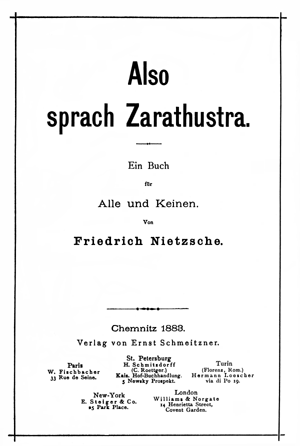
“Thus Spoke Zarathustra”
Title Page of the First Edition (Part 1)
『ツァラトゥストラはかく語りき』
ニーチェの『ツァラトゥストラはかく語りき』は、哲学者の思想を詩的に表現した作品です。
ニーチェは、自らを超人と称するツァラトゥストラという架空の人物を登場させ、彼の言葉と行動を通して、自分の主張する価値観や人生観を展開していきました。
ニーチェは、従来の道徳や宗教、理性や真理といった概念を否定し、人間は自らの力で自分の意志を創造し、自己の完全なる肯定と超克を目指すべきだと説いています。
ニーチェの『ツァラトゥストラはかく語りき』は、西洋哲学史において画期的な作品であり、多くの芸術家や思想家に影響を与えました。
その他の著作
上記以外にもニーチェは有名な著書を残しています。とくに有名なものを簡単に紹介します。
“Thus Spoke Zarathustra”
Nietzsche’s “Thus Spoke Zarathustra” is a poetic expression of philosophical ideas.
Nietzsche introduces the fictional character Zarathustra, whom he labels as the Übermensch (Overman), unfolding his values and perspectives through Zarathustra’s words and actions.
Nietzsche rejects traditional morals, religions, reason, and truth, arguing instead that humans should create their own will and strive for self-affirmation and self-overcoming through their own power.
“Thus Spoke Zarathustra” by Nietzsche stands as a groundbreaking work in Western philosophical history, influencing numerous artists and thinkers.
Other Works
Apart from the above, Nietzsche has left behind other famous writings. Here’s a brief introduction to some of the most notable ones.
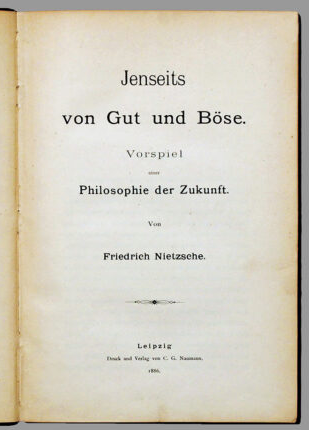
Title Page of the First Edition of “Beyond Good and Evil”
・『善悪の彼岸』:倫理や道徳に関する問題を探求し、伝統的な善悪の観念を批判的に検討しています。
価値観の再評価や個人の自己実現の重要性を主張しました。
“Beyond Good and Evil”: This work explores ethical and moral issues, critically examining traditional concepts of good and evil. It advocates for a reevaluation of values and emphasizes the importance of individual self-realization.
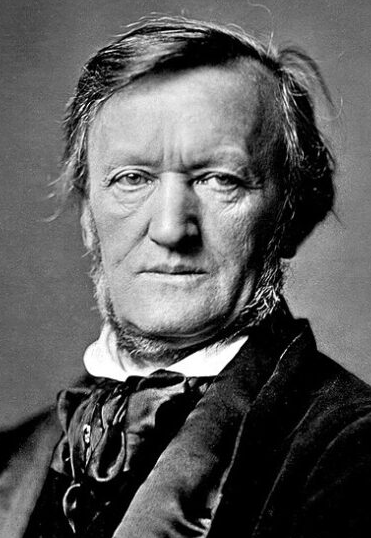
Richard Wagner, 1871
・『ニーチェ対ワーグナー』:ニーチェとリヒャルト・ワーグナーの対立や意見の不一致を探求する著作で、二人の関係性と哲学的立場の違いが明らかにされています。
“Nietzsche versus Wagner”: This work explores the conflict and philosophical differences between Friedrich Nietzsche and Richard Wagner, highlighting their relationship and divergent viewpoints.
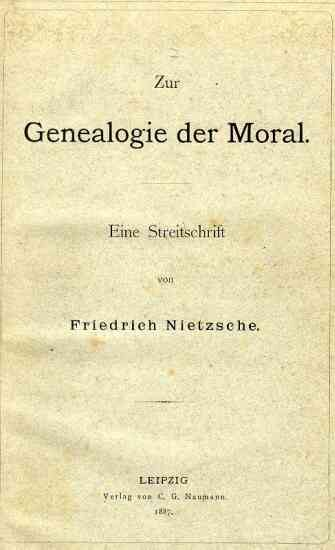
“Genealogy of Morals” First Edition Cover
・『道徳の系譜』:道徳の発展や変化を探究し、奴隷道徳と貴族道徳の相互関係と影響について詳しく議論しています。
・『反キリスト』:キリスト教や宗教に対するニーチェの批判的な見解を述べた著作で、キリスト教の価値観や教義に対する彼の反発が表現されています。
・”Genealogy of Morals”: Explores the development and changes in morality, discussing in detail the interrelation and influence between slave morality and noble morality.
・”Anti-Christ”: A work where Nietzsche expresses his critical views on Christianity and religion, articulating his opposition to Christian values and doctrines.
ニーチェと音楽 作曲活動
フリードリヒ・ニーチェは、哲学者としてだけでなく、作曲家としても活動したことがある人物です。
Nietzsche and Music: Compositional Activities
Friedrich Nietzsche, known not only as a philosopher but also as a composer, engaged in musical activities.
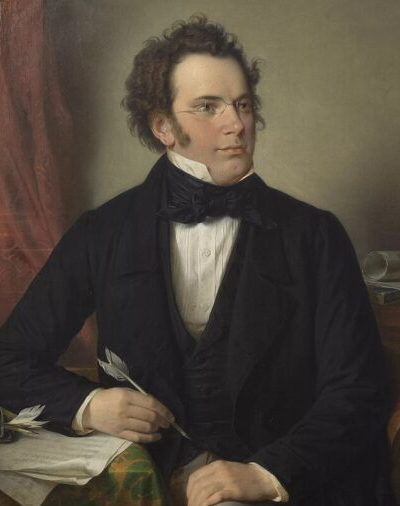
Franz Peter Schubert (January 31, 1797 – November 19, 1828): Austrian Composer
ニーチェは13歳の頃から歌曲やピアノ曲を作曲し、シューベルトやシューマンなどの前期ロマン派の影響を受けた曲風でした。
Since the age of 13, Nietzsche composed songs and piano pieces influenced by early Romantic composers such as Schubert and Schumann.
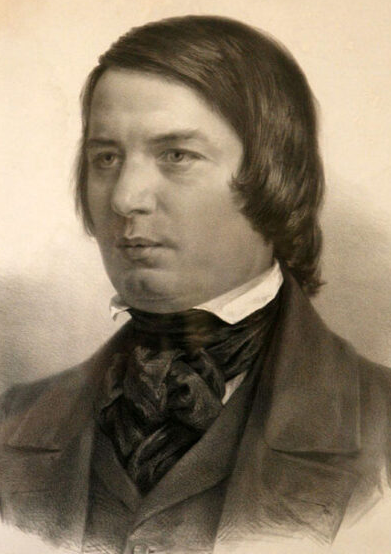
Robert Alexander Schumann (June 8, 1810 – July 29, 1856) represented the German Romantic era as a prominent composer.
ニーチェは音楽に対する情熱を持ち続けましたが、自分の作品が評価されなかったことや、尊敬していたワーグナーとの関係が悪化したことなどが原因で、次第に音楽から遠ざかっていきました。
ニーチェの音楽は、彼の哲学と同様に独創的で表現豊かなものでしたが、その時代には理解されにくかったのかもしれません。
Nietzsche maintained a passion for music throughout his life, but gradually distanced himself from it due to reasons such as his works not being appreciated and the deterioration of his relationship with the respected Wagner. Nietzsche’s music, like his philosophy, was original and expressive, yet perhaps ahead of its time and difficult for his contemporaries to grasp.



コメント
[…] ニーチェ 「哲学の巨星」 知的探求の哲学と文化革命 生涯の軌跡と遺産 […]